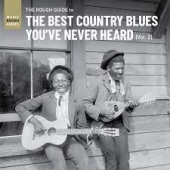
Various Artists
The Rough Guide To The Best Country Blues You've Never Heard (vol.2)
Label: World Music Network
Genre: 60s / 70s Rock / Pop / Progressive / Kraut
Availability
- LP €15.99 In Stock
Loosely speaking, country blues is best described as the first flowering of acoustic, mainly guitar-driven forms of the blues, often incorporating elements of ragtime, Gospel, hillbilly and Dixieland jazz. The term also provides a convenient general heading for all the multiple regional styles and variations such as Piedmont, Memphis, Texas & Delta etc. Keeping this in mind, we have tried to touch on its many different facets, including some real hidden oddities like the Gospel parody ‘G. Burns Is Gonna Rise Again’ by T. C. Johnson, Blue Coat Tom Nelson & Porkchop, a bizarre name even by blues standards. In fact, it seems that the deeper you dig into the blues annals the more intriguing the names become, such as "Hi" Henry Brown, whose wonderful opener ‘Skin Man Blues’ is akin to the playing of other St. Louis-based bluesmen such as Henry Townsend and Charley Jordan.
Although many of the artists won’t be familiar, there’s certainly a few well-known blues standards in this collection, from Long "Cleve” Reed & Little Harvey Hull’s wonderful take on the classic murder ballad ‘Stackolee’ to the mysterious Tommie Bradley’s heartfelt rendition of ‘Nobody Knows You When You're Down and Out’. Of particular note is the upbeat instrumental version of ‘Careless Love’ which highlights the virtuosic harmonica playing of Eddie Mapp, who is joined by fellow East Coast bluesman Slim Barton on guitar. Also from the Eastern states, Bull City Red delivers a great performance of Memphis Minnie’s ‘Now I'm Talking About You’, complete with the nimble guitar accompaniment of Reverend Gary Davis.
Nowhere was the incredible diversity of early blues forms more concentrated than in the city of Memphis, which brought together both rural and urban musical traditions and songs from traveling minstrel and medicine shows. Both Jed Davenport & His Beale Street Jug Band and Minnie Wallace and her Night Hawks give us a taster of this upbeat and vibrant scene from a city whose bright lights had long provided a lure for blues musicians from nearby Mississippi and beyond.
Although the guitar was undoubtedly the chief vehicle of expression for country blues artists, there were many exceptions, as in the case of the mysterious Bogus Ben Covington who accompanied his bawdy songs like the featured ‘It’s A Fight Like That’ with a banjo-mandolin and harmonica on a rack. Similarly, the equally salacious ‘Stuff Stomp’ sees the singer/guitarist Elijah Jones receive privileged accompaniment by the master of blues mandolin Yank Rachell. Another mandolinist Matthew Prater, along with the help of guitarist Napoleon “Nap” Hayes, recorded the instrumental gem ‘Easy Winner’ which combined elements of ragtime and blues into a string band format, borrowing freely from Scott Joplin’s most famous piece, ‘The Entertainer'. Of all the double acts, undoubtedly the most unlikely partnership is the seamless marrying of the clarinet with Will Day’s guitar playing and vocals on ‘Sunrise Blues’, which gives the song a heartfelt intensity unto its own.
Like other more well-known country bluesmen who found a renewed level of popularity in the folk revival of the 1960s, a few of these featured artists also made comebacks of sorts including Walter Vincent, a member of the Mississippi Sheiks and co-writer of the blues standard ‘Sitting on Top of the World’, as well as John Henry Barbee, whom the great Willie Dixon found working as an ice cream server in Chicago, before bringing him back to the stage in 1964. The Texas bluesman Jesse “Babyface” Thomas, brother of the more well-known Ramblin’ Thomas, was another who managed to forge a long musical career spanning eight decades, and his closing track ‘No Good Woman Blues’ belies the fact that he was only 18 years old when he recorded it.
